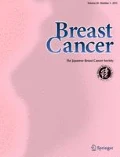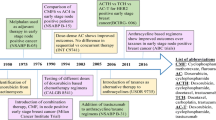Abstract
Predictive factors for anthracycline-based chemotherapy have yet to be incorporated into daily practice. Meta-analyses of studies using anthracycline-based treatment regimens have shown an improved prognosis for human epidermal growth factor receptor type 2 (HER2)-positive tumors, but not for HER2-negative tumors compared with results of non-anthracycline regimens. Currently it is believed that the positive association between HER2 status and anthracycline sensitivity is indirect, that is, their association may be mediated through topoisomerase II alpha (TOP2A), a target molecule of anthracyclines, since TOP2A is near HER-2 and co-amplification of the TOP2A gene frequently occurs in HER2-amplified tumors. This strongly suggests that TOP2A gene amplification is a predictive factor for anthracyline-based regimens. The Collaborative Study Group of Scientific Research of the Japanese Breast Cancer Society has demonstrated that TOP2A-positive and BRCA1-negative subsets evaluated by immunohistochemical staining show a significantly higher pathological complete response when treated with preoperative epirubicin-containing regimens. Combining these findings with the observation that triple-negative tumors and basal-like tumors respond to anthracycline treatment suggests that not only HER2-positive tumors but also a distinct subset of HER2-negative tumors may be sensitive to anthracycline-based regimens.
Similar content being viewed by others
References
Jones SE, Savin MA, Holmes FA, O’Shaughnessy JA, Blum JL, Vukelja S, et al. Phase III trial comparing doxorubicin plus cyclophosphamide with docetaxel plus cyclophosphamide as adjuvant therapy for operable breast cancer. J Clin Oncol. 2006;24:5381–7.
Wang JC. DNA topoisomerases. Annu Rev Biochem. 1996;65:635–92.
Cummings J, Smyth JF. DNA topoisomerase I and II as targets for rational design of new anticancer drugs. Ann Oncol. 1993;4:533–43.
Vincent-Salomon A, Rousseau A, Jouve M, Beuzeboc P, Sigal-Zafrani B, Freneaux P, et al. Proliferation markers predictive of the pathological response and disease outcome of patients with breast carcinomas treated by anthracycline-based preoperative chemotherapy. Eur J Cancer. 2004;40:1502–8.
Kuerer HM, Newman LA, Smith TL, Ames FC, Hunt KK, Dhingra K, et al. Clinical course of breast cancer patients with complete pathologic primary tumor and axillary lymph node response to doxorubicin-based neoadjuvant chemotherapy. J Clin Oncol. 1999;17:460–9.
Sachelarie I, Grossbard ML, Chadha M, Feldman S, Ghesani M, Blum RH. Primary systemic therapy of breast cancer. Oncologist. 2006;11:574–89.
Veneroni S, Zaffaroni N, Daidone MG, Benini E, Villa R, Silvestrini R. Expression of P-glycoprotein and in vitro or in vivo resistance to doxorubicin and cisplatin in breast and ovarian cancers. Eur J Cancer. 1994;30A:1002–7.
Kandioler-Eckersberger D, Ludwig C, Rudas M, Kappel S, Janschek E, Wenzel C, et al. TP53 mutation and p53 overexpression for prediction of response to neoadjuvant treatment in breast cancer patients. Clin Cancer Res. 2000;6:50–6.
Pani G, Bedogni B, Anzevino R, Colavitti R, Palazzotti B, Borrello S, et al. Deregulated manganese superoxide dismutase expression and resistance to oxidative injury in p53-deficient cells. Cancer Res. 2000;60:4654–60.
Penault-Llorca F, Cayre A, Bouchet Mishellany F, Amat S, Feillel V, Le Bouedec G, et al. Induction chemotherapy for breast carcinoma: predictive markers and relation with outcome. Int J Oncol. 2003;22:1319–25.
Park K, Kim J, Lim S, Han S. Topoisomerase II-alpha (topoII) and HER2 amplification in breast cancers and response to preoperative doxorubicin chemotherapy. Eur J Cancer. 2003;39:631–4.
Pritchard KI, Shepherd LE, O’Malley FP, Andrulis IL, Tu D, Bramwell VH, et al. National cancer institute of Canada clinical trials group. HER2 and responsiveness of breast cancer to adjuvant chemotherapy. N Engl J Med. 2006;354:2103–11.
Pritchard KI, Messersmith H, Elavathil L, Trudeau M, O’Malley F, Dhesy-Thind B. HER-2 and topoisomerase II as predictors of response to chemotherapy. J Clin Oncol. 2008;26:736–44.
Järvinen TA, Tanner M, Rantanen V, Bärlund M, Borg A, Grénman S, et al. Amplification and deletion of topoisomerase II alpha associate with ErbB-2 amplification and affect sensitivity to topoisomerase II inhibitor doxorubicin in breast cancer. Am J Pathol. 2000;156:839–47.
Durbecq V, Desmed C, Paesmans M, Cardoso F, Di Leo A, Mano M, et al. Correlation between topoisomerase-II alpha gene amplification and protein expression in HER-2 amplified breast cancer. Int J Oncol. 2004;25:1473–9.
Cardoso F, Durbecq V, Larsimont D, Paesmans M, Leroy JY, Rouas G, et al. Correlation between complete response to anthracycline-based chemotherapy and topoisomerase II-alpha gene amplification and protein overexpression in locally advanced/metastatic breast cancer. Int J Oncol. 2004;24:201–9.
Di Leo A, Gancberg D, Larsimont D, Tanner M, Jarvinen T, Rouas G, et al. HER-2 amplification and topoisomerase II alpha gene aberrations as predictive markers in node-positive breast cancer patients randomly treated either with an anthracycline-based therapy or with cyclophosphamide, methotrexate, and 5-fluorouracil. Clin Cancer Res. 2002;8:1107–16.
Coon JS, Marcus E, Gupta-Burt S, Seelig S, Jacobson K, Chen S, et al. Amplification and overexpression of topoisomerase II alpha predict response to anthracycline-based therapy in locally advanced breast cancer. Clin Cancer Res. 2002;8:1061–7.
Villman K, Sjöström J, Heikkilä R, Hultborn R, Malmström P, Bengtsson NO, et al. TOP2A and HER2 gene amplification as predictors of response to anthracycline treatment in breast cancer. Acta Oncol. 2006;45:590–6.
Orlando L, Del Curto B, Gandini S, Ghisini R, Pietri E, Torrisi R, et al. Topoisomerase II alpha gene status and prediction of pathological complete remission after anthracycline-based neoadjuvant chemotherapy in endocrine non-responsive Her2/neu-positive breast cancer. Breast. 2008;17:506–11.
Manna Edel F, Teixeira LC, Alvarenga M. Association between immunohistochemical expression of topoisomerase II alpha, HER2 and hormone receptors and response to primary chemotherapy in breast cancer. Tumori. 2006;92:222–9.
MacGrogan G, Rudolph P, Mascarel Id I, Mauriac L, Durand M, Avril A, et al. DNA topoisomerase II alpha expression and the response to primary chemotherapy in breast cancer. Br J Cancer. 2003;89:666–71.
Martin-Richard M, Muñoz M, Albanell J, Colomo L, Bellet M, Rey MJ, et al. Serial topoisomerase II expression in primary breast cancer and response to neoadjuvant anthracycline-based chemotherapy. Oncology. 2004;66:388–94.
Durbecq V, Paesmans M, Cardoso F, Desmedt C, Di Leo A, Chan S, et al. Topoisomerase-II alpha expression as a predictive marker in a population of advanced breast cancer patients randomly treated either with single-agent doxorubicin or single-agent docetaxel. Mol Cancer Ther. 2004;3:1207–14.
Miyoshi Y, Kurosumi M, Kurebayashi J, Matsuura N, Takahashi M, Tokunaga E, et al. Topoisomerase II alpha-positive and BRCA1-negative phenotype: association with favorable response to epirubicin-based regimens for human breast cancers. Cancer Lett. 2008;264:44–53.
Petit T, Wilt M, Velten M, Millon R, Rodier JF, Borel C, et al. Comparative value of tumour grade, hormonal receptors, Ki-67, HER-2 and topoisomerase II alpha status as predictive markers in breast cancer patients treated with neoadjuvant anthracycline-based chemotherapy. Eur J Cancer. 2004;40:205–11.
Knoop AS, Knudsen H, Balslev E, Rasmussen BB, Overgaard J, Nielsen KV, et al. Retrospective analysis of topoisomerase IIa amplifications and deletions as predictive markers in primary breast cancer patients randomly assigned to cyclophosphamide, methotrexate, and fluorouracil or cyclophosphamide, epirubicin, and fluorouracil: Danish breast cancer cooperative group. J Clin Oncol. 2005;23:7483–90.
Scandinavian Breast Group Trial 9401, Tanner M, Isola J, Wiklund T, Erikstein B, Kellokumpu-Lehtinen P, et al. Topoisomerase II alpha gene amplification predicts favorable treatment response to tailored and dose-escalated anthracycline-based adjuvant chemotherapy in HER-2/neu-amplified breast cancer: Scandinavian breast group trial 9401. J Clin Oncol. 2006;24:2428–36.
Rudolph P, MacGrogan G, Bonichon F, Frahm SO, de Mascarel I, Trojani M, et al. Prognostic significance of Ki-67 and topoisomerase II alpha expression in infiltrating ductal carcinoma of the breast. A multivariate analysis of 863 cases. Breast Cancer Res Treat. 1999;55:61–71.
Delaloge S, Pautier P, Kloos I. BRCA1-linked breast cancer (BC) is highly more chemosensitive than its BRCA2-linked or sporadic counterparts. Paper presented at 27th congress of the European society for medical oncology, 18–22 October 2002, Nice, France. 2002; Abstract 120.
Goffin JR, Chappuis PO, Bégin LR, Wong N, Brunet JS, Hamel N, et al. Impact of germline BRCA1 mutations and overexpression of p53 on prognosis and response to treatment following breast carcinoma: 10-year follow up data. Cancer. 2003;97:527–36.
Fedier A, Steiner RA, Schwarz VA, Lenherr L, Haller U, Fink D. The effect of loss of Brca1 on the sensitivity to anticancer agents in p53-deficient cells. Int J Oncol. 2003;22:1169–73.
Liedtke C, Mazouni C, Hess KR, André F, Tordai A, Mejia JA, et al. Response to neoadjuvant therapy and long-term survival in patients with triple-negative breast cancer. J Clin Oncol. 2008;26:1275–81.
Rouzier R, Perou CM, Symmans WF, Ibrahim N, Cristofanilli M, Anderson K, et al. Breast cancer molecular subtypes respond differently to preoperative chemotherapy. Clin Cancer Res. 2005;11:5678–85.
Conforti R, Boulet T, Tomasic G, Taranchon E, Arriagada R, Spielmann M, et al. Breast cancer molecular subclassification and estrogen receptor expression to predict efficacy of adjuvant anthracyclines-based chemotherapy: a biomarker study from two randomized trials. Ann Oncol. 2007;18:1477–83.
Arriola E, Rodriguez-Pinilla SM, Lambros MB, Jones RL, James M, Savage K, et al. Topoisomerase II alpha amplification may predict benefit from adjuvant anthracyclines in HER2 positive early breast cancer. Breast Cancer Res Treat. 2007;106:181–9.
Author information
Authors and Affiliations
Corresponding author
Additional information
From the Collaborative Study Group of Scientific Research of the Japanese Breast Cancer Society.
About this article
Cite this article
Miyoshi, Y., Kurosumi, M., Kurebayashi, J. et al. Predictive factors for anthracycline-based chemotherapy for human breast cancer. Breast Cancer 17, 103–109 (2010). https://doi.org/10.1007/s12282-009-0152-6
Received:
Accepted:
Published:
Issue Date:
DOI: https://doi.org/10.1007/s12282-009-0152-6




